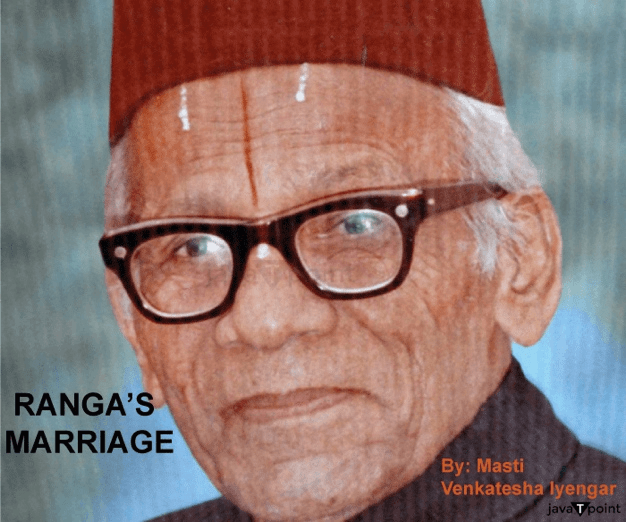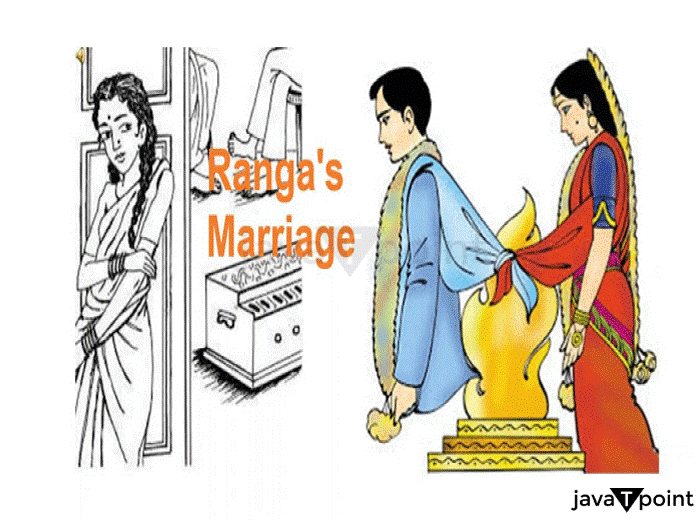Ranga's Marriage Summary Class 11 EnglishAbout AuthorVenkatesha Iyengar, also known as Masti Venkatesh Iyengar, was an eminent Indian writer and scholar who played a vital role in shaping modern Kannada literature. Born on June 6, 1891, in the humble village of Masti in Karnataka, India, he is regarded as a pioneer in his field. Venkatesha Iyengar completed his education in English literature at Maharaja's College in Mysore before embarking on a teaching career. He served as a professor of English at several colleges in Mysore, showcasing his profound understanding of both English and Kannada languages. 
As a writer, Venkatesha Iyengar left a lasting impact on Kannada literature. His extensive body of work encompassed various genres such as novels, short stories, essays, and plays. Known for his realistic portrayal of characters and his astute social commentary, he delved into the depths of human emotions and relationships. He had a penchant for highlighting the struggles and aspirations of ordinary people, bringing their stories to the forefront. Among his numerous acclaimed works, one stands out prominently: the novel "Chikkaveera Rajendra." This masterpiece of historical fiction illuminates the life and times of the legendary king Chikkaveera Rajendra of Kodagu. The novel not only captures the essence of the era but also captivates readers with its literary brilliance, solidifying its status as a gem in Kannada literature. Another notable work by him is the collection of short stories titled "Sanna Kathegalu" (Small Stories), which presents slices of life and explores various themes. Venkatesha Iyengar's writing style was characterized by his attention to detail, vivid descriptions, and the portrayal of nuanced human emotions. He often highlighted social issues and used his stories as a medium to challenge societal norms and conventions. Summary
"Ranga's Marriage" is a poignant and thought-provoking short story written by Masti Venkatesha Iyengar. Set in rural Karnataka, India, the story explores the themes of caste, dowry, tradition, and modernity in the context of arranged marriages. The protagonist of the story is Ranga, a young man from a lower caste who returns to his village after completing his education in the city. Ranga's father, Venkatappa, and his friend, Timanna, take on the task of finding a suitable bride for him. However, their search proves to be challenging as potential matches reject Ranga based on his caste, financial status, or physical appearance. As the search for a bride becomes increasingly difficult, Venkatappa and Timanna come up with a plan. They convince Ranga to pretend to be the son of a wealthy and influential man from the city, hoping that this deception will attract a bride and her family. Their plan succeeds when Ratna, a beautiful and educated girl, and her family agree to the marriage, unaware of Ranga's true background. However, on the day of the wedding, Ratna discovers the truth. At first, Ratna is outraged and humiliated at the deception, but she eventually decides to proceed with the marriage, valuing Ranga's character and education over social status or material wealth. The story raises several social and cultural issues prevalent in Indian society. One of the central themes of the story is the rigid caste system that exists in India. Ranga's lower caste becomes a significant obstacle in finding a suitable bride. The rejection he faces from several families highlights the deep-rooted prejudices and discrimination based on caste that were prevalent at the time. The story also raises questions about the practice of dowry, which is a significant issue in many parts of India. In the story, Ranga's prospective brides and their families reject him due to his perceived lack of financial prospects. This rejection is often tied to the demand for dowry, where the groom's family expects a substantial financial contribution from the bride's family. The story indirectly critiques this practice by emphasizing the importance of character and education rather than material wealth. Furthermore, "Ranga's Marriage" explores the clash between traditional and modern values. Ranga, as an educated individual exposed to urban culture, represents modernity. However, the societal expectations and traditional norms of his village create hurdles in his marriage search. The story presents a conflict between the conservative mindset of the villagers and the changing aspirations of the younger generation. At its core, the story conveys a message of love, acceptance, and the importance of inner qualities in relationships. Ratna's decision to marry Ranga, despite the deception, highlights her compassion and understanding. It emphasizes the significance of looking beyond superficial factors such as social status, physical appearance, or material wealth and valuing qualities like education, character, and emotional compatibility in choosing a life partner. ConclusionIn conclusion, "Ranga's Marriage" is a powerful and evocative story that provides an insightful portrayal of Indian society during the time it was written. The story offers a nuanced understanding of the complexities of arranged marriages and the challenges faced by individuals seeking companionship in a traditional setting. It highlights the impact of social and cultural factors such as caste, dowry, and tradition, on the lives of individuals and the choices they make. Ultimately, "Ranga's Marriage" stands as a testament to the transformative power of love and acceptance, which can overcome even the most significant obstacles and societal norms.
Next TopicRussian Revolution Summary
|
 For Videos Join Our Youtube Channel: Join Now
For Videos Join Our Youtube Channel: Join Now
Feedback
- Send your Feedback to [email protected]
Help Others, Please Share









